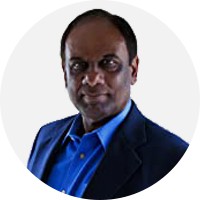The views expressed in our content reflect individual perspectives and do not represent the authoritative views of the Baha'i Faith.
Knowing the truth is our anchor to reality, and without it, life is filled with fear. Being unable to distinguish between falsehood and truth is like navigating your way through New York City without a map or the ability to ask for directions.
In any aspect of life, we need to know the facts to feel like we walk on firm ground. To do so, we rely on the power of understanding, a gift given to every human being that we use to fill our consciousness with knowledge that we think is true. Two things are happening: an influx of information and, through a filtering mechanism, translation of the data into a world that feels real.
How do we safeguard our integrity from being hijacked by misinformation or manipulation?
We all accept some basic truths: there are seven days in a week; death is natural; humans need food, air, and water to survive. But as we travel the path of life, we end up absorbing different beliefs. From birth, we are bombarded with information from parents, siblings, teachers, TV, leaders, scientists, friends, newspapers, heroes, experts, mentors, and so on. The stream of input is endless, and it is increasing in volume as technology advances. Businesses, marketers, and politicians understand how our belief system is molded.
Sometimes the acceptance of data as truth can happen instantly. For example, if a woman — let’s call her Sylvia — was searching on Google for an arthritis remedy. After listening to a presentation by a spiritual teacher, Sylvia not only instantly accepted his cure but became his devotee too. On the other hand, if there’s a man — let’s call him Joe — who believes the Earth is flat, refuses to change his mind regardless of how many presentations he watches that debunk the theory.

But nothing is permanent, and every belief can be rejected or replaced. It is so easy to pollute our consciousness and, subsequently, our actions; therefore, both deserve a closer look. A scary part of life is that we could easily do something horrible based on others’ advice. In this discussion of accountability, truthfulness is crucially important. How do we safeguard our integrity from being hijacked by misinformation or manipulation?
Many articles and books have been written on this most critical issue that shapes individuals, societies, nations, and humanity. In “Truth vs. Falsehood: How to Tell the Difference,” Dr. David R. Hawkins, a psychiatrist, explained that the purpose of his presentation on truthfulness is “the alleviation of suffering by virtue of replacing falsehood with truth and sharing the knowledge of how to arrive at truth on one’s own, for the pathway to its source resides within. For those who are aligned with truth, the path lights up; for those who refuse it, the path is darkened. All of us are free to choose.”
The question is, how do individuals accept the truth? It is a complicated process.
Say you are not feeling well, and your doctor diagnoses your illness as a heart problem. A cardiologist then tells you that you had an anxiety attack, and your heart is just fine. A third medical professional tells you that you have cancer. Now you are totally confused: Whom can you trust? Depending on your personality, you might think there is a conspiracy against you. Or, upon a rational analysis, you may decide that all three are not lying, but each physician came to a diagnosis based on their perception of reality, and you should carry out a few more tests to determine the truth.
To help us in this search for truth, each of us possesses the power of discovery. According to Baha’u’llah, the prophet and founder of the Baha’i Faith, “First and foremost among these favors, which the Almighty hath conferred upon man, is the gift of understanding. This gift giveth man the power to discern the truth in all things, leadeth him to that which is right, and helpeth him to discover the secrets of creation.”
The intellectual faculty processes incoming information and accepts it as part of reality. For example, I believe in evolution, that the Earth is round, and that atoms exist. I can’t prove or witness any of them, so I rely on scientific facts. Anything that goes through my senses to my brain is rigorously examined before it becomes part of me.
At a social level, I embrace the oneness of humanity, consider helping others as a good thing, believe gender equality is an undeniable truth, and trust that acquiring the right skills is a ticket to success in life. Again, credible sources, personal experience, and my own power of comprehension have allowed me to accept these ideas.
But besides understanding the physical world, there is another kind of belief that only comes through the soul. I was once an atheist, but I now believe in a Creator. I have never met this all-powerful, compassionate, and all-loving Being, yet I accept its existence as reality because everything I have read from holy scriptures and experienced in my life confirms it.
Independent investigation of truth is the key to avoid being cheated with falsehood. Abdu’l-Baha, the son of Baha’u’llah and his designated successor, explained that we need to investigate the truth independently “so that the world of humanity may be saved from the darkness of imitation and attain to the truth; may tear off and cast away this ragged and outgrown garment of 1,000 years ago and may put on the robe woven in the utmost purity and holiness in the loom of reality. As reality is one and cannot admit of multiplicity, therefore different opinions must ultimately become fused into one.”
Generally, it takes three encounters from seemingly different and independent sources to mold a human belief. If we hope to find the truth in a world full of contradicting ideas, we need to make use of all the resources at our disposal: science, history, experience, holy scripture — and our own power of discovery.
















Comments
Sign in or create an account
Continue with Googleor